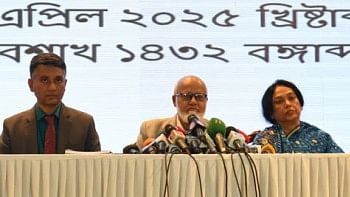EC begins dialogue with political parties
The Election Commission yesterday kicked off their elaborate dialogue process for reforms in the EC with the Liberal Democratic Party (LDP) and Jatiya Party (JP) expressing their support for introduction of an electronic voting system (EVS) in the next general polls.
As the main opposition BNP continued to shun it, both LDP and JP expressed their satisfaction with the electronic system at talks that lasted for over three hours.
EC will hold talks with 38 political parties registered with the EC, leaders of the civil society and media personalities to get their views on different issues including the EVS, strengthening of the EC, appointment of election commissioners and government funding for political parties to meet election expenses.
BNP has opposed the EC’s move to introduce an EVS saying the move is an ‘ill intention’ by the government to manipulate the results of the upcoming parliamentary polls.
The party is yet to decide whether or not to participate in the talks with EC, saying the EC was working ‘for’ the present government’s interests.
Chief Election Commissioner (CEC) ATM Shamsul Huda said BNP’s reservation about the new system comes from their inadequate knowledge about how it works. He pointed out that the system has already been used on a limited scale in the Chittagong City Corporation election.
Huda expressed hope that BNP would eventually join the dialogue.
LDP President Col (retd) Oli Ahmed, who led a five member delegation to the talks, said afterwards that he had called upon the EC to introduce use of fingerprints to identify voters.
Talking to the press, the veteran politician opined that political parties should get funding in proportion to the votes they have obtained in the previous election. He called for new policies to be introduced for funding to newly formed parties.
Col (retd) Oli also proposed that government should provide funds to political parties to set up their offices.
"Once this is done, no political party can resort to raising funds by extortion from the people," he said.
Anwar Hossain Manju, who led the seven member Jatiya Party team to the talks, pointed out how the EVS is used successfully in neighbouring India. During the talks Professor SM Lutful Kabir from the Institute of Information and Communication Technology, BUET demonstrated how the EVS works and answered queries.
One of the main questions raised by the political parties was if there was any scopes to manipulate the casting of votes or cast fake votes using this system which the BUET professor said was not possible.
The EVS has been prepared locally under the joint collaboration of BUET and Bangladesh Machine Tools Factory.
The EC sits today with Bangladesher Shaymmobadi Dal and Krishok Shromik Janata League.

 For all latest news, follow The Daily Star's Google News channel.
For all latest news, follow The Daily Star's Google News channel. 



Comments